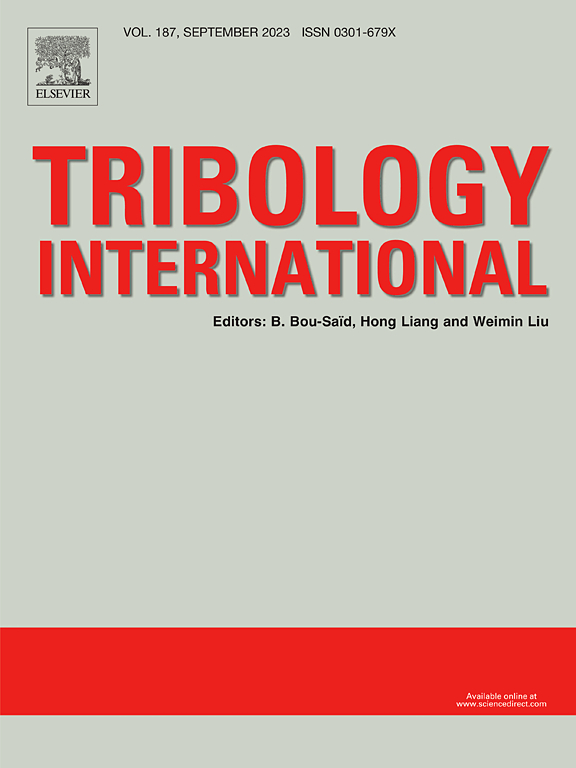In-situ formation of self-lubricating 2D layered tribo-films in TiVNbAlx-WC medium-entropy composites during sliding
IF 6.1
1区 工程技术
Q1 ENGINEERING, MECHANICAL
引用次数: 0
Abstract
Critical applications in aerospace, nuclear, and high-temperature industrial sectors demand metal-matrix self-lubricating materials that maintain stable tribological performance under extreme conditions. However, conventional solid lubricants suffer from inherent low strength and thermal instability. Here this work demonstrates a new type of friction-induced chemical transformation in TiVNbAlx-WC (x = 0, 0.2) composites that creates adaptive lubrication through in-situ formation of high-entropy MAX phases and their delamination into self-organizing 2D layered tribo-films during sliding at 600 °C. WC particles undergo thermal decomposition at 600 °C, releasing carbon atoms that react with the Ti-V-Nb matrix to nucleate MAX phases. Sliding-induced stress gradients promote mechanochemical delamination, transforming bulk MAX phases into 2D layered structures. The resulting 2D tribo-films maintain friction coefficients of 0.38 at 600 °C. This approach demonstrates how compositional engineering can harness extreme tribological conditions to generate beneficial surface chemistry, transforming operational limitations into performance enablers.
TiVNbAlx-WC中熵复合材料滑动过程中自润滑二维层状摩擦膜的原位形成
航空航天、核能和高温工业领域的关键应用需要金属基自润滑材料在极端条件下保持稳定的摩擦学性能。然而,传统的固体润滑剂存在固有的低强度和热不稳定性。在这里,这项工作展示了一种新型的摩擦诱导的化学转变,在TiVNbAlx-WC (x = 0,0.2)复合材料中,在600°C的滑动过程中,通过原位形成高熵MAX相并将其分层成自组织的2D层状摩擦膜来产生自适应润滑。WC颗粒在600℃时发生热分解,释放出碳原子,碳原子与Ti-V-Nb基体反应形成MAX相。滑动引起的应力梯度促进了机械化学分层,将大块MAX相转变为二维层状结构。所得二维摩擦膜在600℃时保持0.38的摩擦系数。这种方法展示了复合材料工程如何利用极端摩擦学条件产生有益的表面化学反应,将操作限制转化为性能提升因素。
本文章由计算机程序翻译,如有差异,请以英文原文为准。
求助全文
约1分钟内获得全文
求助全文
来源期刊

Tribology International
工程技术-工程:机械
CiteScore
10.10
自引率
16.10%
发文量
627
审稿时长
35 days
期刊介绍:
Tribology is the science of rubbing surfaces and contributes to every facet of our everyday life, from live cell friction to engine lubrication and seismology. As such tribology is truly multidisciplinary and this extraordinary breadth of scientific interest is reflected in the scope of Tribology International.
Tribology International seeks to publish original research papers of the highest scientific quality to provide an archival resource for scientists from all backgrounds. Written contributions are invited reporting experimental and modelling studies both in established areas of tribology and emerging fields. Scientific topics include the physics or chemistry of tribo-surfaces, bio-tribology, surface engineering and materials, contact mechanics, nano-tribology, lubricants and hydrodynamic lubrication.
 求助内容:
求助内容: 应助结果提醒方式:
应助结果提醒方式:


